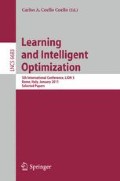Abstract
We address the problem of automated discovery of preferred solutions by an interactive optimization procedure. The algorithm iteratively learns a utility function modeling the quality of candidate solutions and uses it to generate novel candidates for the following refinement. We focus on combinatorial utility functions made of weighted conjunctions of Boolean variables. The learning stage exploits the sparsity-inducing property of 1-norm regularization to learn a combinatorial function from the power set of all possible conjunctions up to a certain degree. The optimization stage uses a stochastic local search method to solve a weighted MAX-SAT problem. We show how the proposed approach generalizes to a large class of optimization problems dealing with satisfiability modulo theories. Experimental results demonstrate the effectiveness of the approach in focusing towards the optimal solution and its ability to recover from suboptimal initial choices.
Access this chapter
Tax calculation will be finalised at checkout
Purchases are for personal use only
Preview
Unable to display preview. Download preview PDF.
References
Branke, J., Deb, K., Miettinen, K., Słowiński, R. (eds.): Multiobjective Optimization: Interactive and Evolutionary Approaches. Springer, Heidelberg (2008)
Battiti, R., Brunato, M., Mascia, F.: Reactive search and intelligent optimization. Springer, Heidelberg (2008)
Battiti, R., Brunato, M.: Reactive search optimization: Learning while optimizing. In: Gendreau, M., Potvin, J.Y. (eds.) Handbook of Metaheuristics, 2nd edn. Int. Series in Op. Res. & Man. Sci., vol. 146, pp. 543–571. Springer Science, Heidelberg (2010)
Battiti, R., Campigotto, P.: Reactive Search Optimization: Learning While Optimizing. An Experiment in Interactive Multi-Objective Optimization. In: VIII Metaheur. Int. Conf. (MIC 2009), Germany. LNCS, Springer, Heidelberg (2009)
Barrett, C., Sebastiani, R., Seshia, S.A., Tinelli, C.: Satisfiability modulo theories. In: Handbook of Satisfiability, pp. 825–885. IOS Press, Amsterdam (2009)
Tibshirani, R.: Regression shrinkage and selection via the lasso. Journal of the Royal Statistical Society, Series B 58, 267–288 (1996)
Friedman, J., Hastie, T., Rosset, S., Tibshirani, R.: Discussion of boosting papers. Annals of Statistics 32, 102–107 (2004)
Suanders, C., Gammerman, A., Vovk, V.: Ridge regression learning algorithm in dual variables. In: ICML 1998 (1998)
Khardon, R., Roth, D., Servedio, R.: Efficiency versus convergence of boolean kernels for on-line learning algorithms. Journal of Artif. Int. Res. 24(1), 341–356 (2005)
Nieuwenhuis, R., Oliveras, A.: DPLL(T) with exhaustive theory propagation and its application to difference logic. In: Etessami, K., Rajamani, S.K. (eds.) CAV 2005. LNCS, vol. 3576, pp. 321–334. Springer, Heidelberg (2005)
de Moura, L., Bjørner, N.: Satisfiability modulo theories: An appetizer. In: Oliveira, M.V.M., Woodcock, J. (eds.) SBMF 2009. LNCS, vol. 5902, pp. 23–36. Springer, Heidelberg (2009)
Nelson, G., Oppen, D.C.: Simplification by cooperating decision procedures. ACM Trans. Program. Lang. Syst. 1(2), 245–257 (1979)
Dutertre, B., de Moura, L.: A Fast Linear-Arithmetic Solver for DPLL(T). In: Ball, T., Jones, R.B. (eds.) CAV 2006. LNCS, vol. 4144, pp. 81–94. Springer, Heidelberg (2006)
Nieuwenhuis, R., Oliveras, A.: On sat modulo theories and optimization problems. In: In Theory and App. of Sat. Testing. LNCS, pp. 156–169. Springer, Heidelberg (2006)
Cimatti, A., Franzén, A., Griggio, A., Sebastiani, R., Stenico, C.: Satisfiability modulo the theory of costs: Foundations and applications. In: Esparza, J., Majumdar, R. (eds.) TACAS 2010. LNCS, vol. 6015, pp. 99–113. Springer, Heidelberg (2010)
Settles, B.: Active learning literature survey. Technical Report Computer Sciences Technical Report 1648, University of Wisconsin-Madison (2009)
Radlinski, F., Joachims, T.: Active exploration for learning rankings from clickthrough data. In: 13th ACM SIGKDD International Conference on Knowledge Discovery and Data Mining (KDD 2007), pp. 570–579. ACM Press, New York (2007)
Xu, Z., Akella, R., Zhang, Y.: Incorporating diversity and density in active learning for relevance feedback. In: Amati, G., Carpineto, C., Romano, G. (eds.) ECIR 2007. LNCS, vol. 4425, pp. 246–257. Springer, Heidelberg (2007)
Guyon, I., Weston, J., Barnhill, S., Vapnik, V.: Gene selection for cancer classification using support vector machines. Machine Learning 46(1-3), 389–422 (2002)
Chapelle, O., Vapnik, V., Bousquet, O., Mukherjee, S.: Choosing multiple parameters for support vector machines. Machine Learning 46(1-3), 131–159 (2002)
Kaizhu, H., Irwin, K., Michael, R.: Direct Zero-Norm Optimization for Feature Selection. In: IEEE International Conference on Data Mining, pp. 845–850 (2008)
Gelain, M., Pini, M.S., Rossi, F., Venable, K.B., Walsh, T.: Elicitation strategies for soft constraint problems with missing preferences: Properties, algorithms and experimental studies. Artif. Intell. 174(3-4), 270–294 (2010)
Gelain, M., Pini, M.S., Rossi, F., Venable, K.B., Wilson, N.: Interval-valued soft constraint problems. Annals of Mat. and Art. Int. 58, 261–298 (2010)
Zhu, J., Rosset, S., Hastie, T., Tibshirani, R.: 1-norm Support Vector Machines. In: Neural Information Processing Systems. MIT Press, Cambridge (2003)
Chakrabarti, S., Khanna, R., Sawant, U., Bhattacharyya, C.: Structured learning for non-smooth ranking losses. In: 14th ACM SIGKDD International Conference on Knowledge Discovery and Data Mining, KDD 2008, pp. 88–96. ACM, New York (2008)
Weston, J., Elisseeff, A., Schölkopf, B., Tipping, M.: Use of the zero norm with linear models and kernel methods. Journal of Mach. Learn. Res. 3, 1439–1461 (2003)
Author information
Authors and Affiliations
Editor information
Editors and Affiliations
Rights and permissions
Copyright information
© 2011 Springer-Verlag Berlin Heidelberg
About this paper
Cite this paper
Campigotto, P., Passerini, A., Battiti, R. (2011). Active Learning of Combinatorial Features for Interactive Optimization. In: Coello, C.A.C. (eds) Learning and Intelligent Optimization. LION 2011. Lecture Notes in Computer Science, vol 6683. Springer, Berlin, Heidelberg. https://doi.org/10.1007/978-3-642-25566-3_25
Download citation
DOI: https://doi.org/10.1007/978-3-642-25566-3_25
Publisher Name: Springer, Berlin, Heidelberg
Print ISBN: 978-3-642-25565-6
Online ISBN: 978-3-642-25566-3
eBook Packages: Computer ScienceComputer Science (R0)

